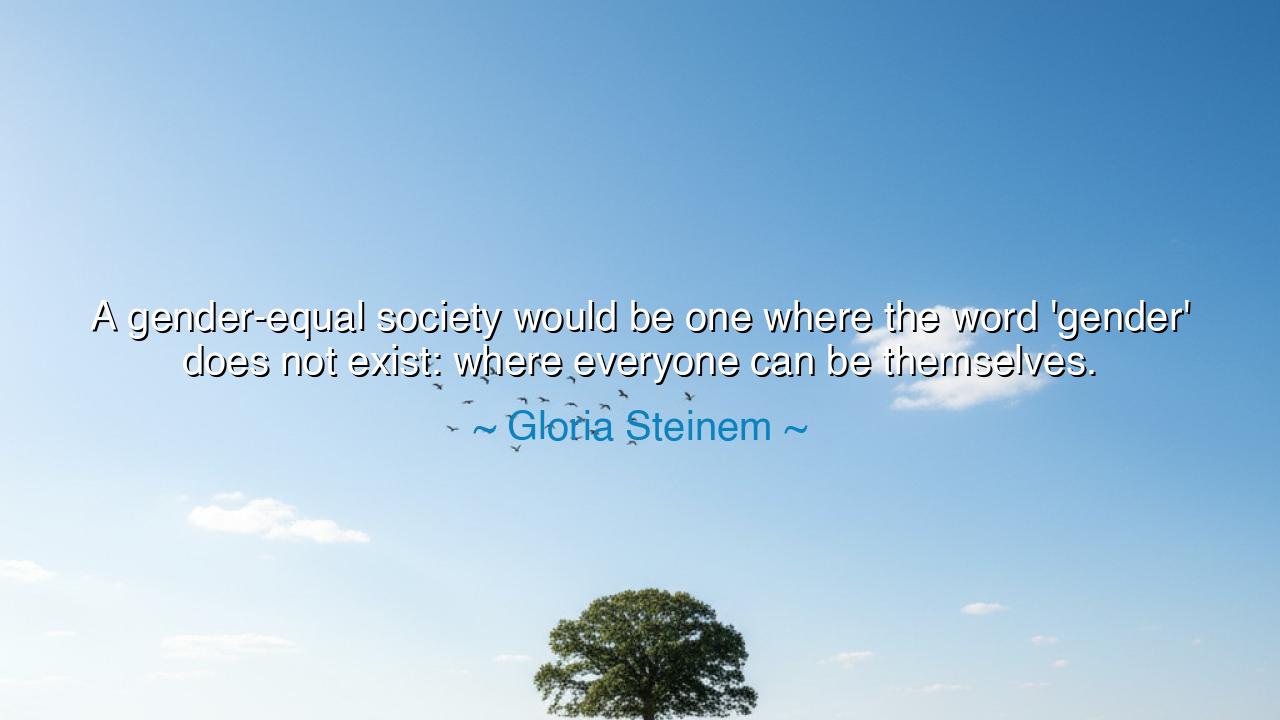
A gender-equal society would be one where the word 'gender' does
A gender-equal society would be one where the word 'gender' does not exist: where everyone can be themselves.






Hear the voice of Gloria Steinem, the fierce torchbearer of equality, who declared: “A gender-equal society would be one where the word ‘gender’ does not exist: where everyone can be themselves.” These words are not merely a dream but a vision of liberation, a vision where the walls of expectation crumble and human beings walk unchained by labels. They remind us that the divisions of gender are not laws of nature, but cages built by custom, tradition, and power. Steinem calls us to imagine a future where these cages are broken, and the soul may move freely, like wind over the ocean.
When she speaks of a gender-equal society, she does not mean one where men and women are merely given the same rations, the same wages, the same opportunities. No—she envisions something deeper: a world where the very concept of gender, as a chain of rules and roles, dissolves. In such a world, no one is told, “This you cannot do, for it is not fitting for your sex.” Instead, all are judged by their humanity, their gifts, their spirit. This is a vision not of sameness, but of freedom.
Consider the long chains of history, when women were told they could not inherit land, could not learn letters, could not sit in parliament or stand in battle. Yet, again and again, these chains were broken by those who defied them. Joan of Arc, clad in armor, led armies when women were thought fit only for the hearth. Mary Wollstonecraft, with her pen, declared the rights of women in an age that mocked her. These were glimpses of Steinem’s vision: moments when the word gender lost its power to dictate destiny, and the individual shone through as a being beyond man or woman—simply human.
Look also to the suffrage movements of the nineteenth and twentieth centuries. For centuries, politics was thought the realm of men alone, but women across nations rose with banners and voices, demanding the vote. In Britain, the suffragettes endured prison and hunger strikes; in America, the marchers faced violence and ridicule. Yet they prevailed. And when the ballot was won, the word gender weakened a little more. It no longer defined who was worthy to speak in the halls of power. This struggle shows us that Steinem’s dream, though far from complete, is not beyond reach.
The wisdom of her words lies in their radical simplicity. To erase the word gender is not to deny difference, but to refuse hierarchy. It is to end the ancient lie that one form of humanity must rule over the other, that destiny is carved not by will but by birth. She teaches us that true freedom comes not when men and women are the same, but when they are free to be fully themselves—without expectation, without chains, without shame.
The lesson for us is clear: we must labor not only for equal rights, but for equal recognition of the soul. We must teach our children that they are not bound by what gender prescribes, but free to choose their path—be it in science, in art, in leadership, in care. We must challenge every custom, every law, every whisper that says, “This is not for you, for you are man, or you are woman.” Until that whisper is silenced, Steinem’s vision remains unfinished.
Therefore, O listener, let your actions be these: in your home, in your school, in your work, treat no one as bound by gender. Lift the chains from others by your example, and live so that no part of your humanity is silenced. Support those who struggle for equality, for their fight is the fight of us all. And remember this truth: when the word gender loses its power to divide, then at last we shall live in a society where everyone can truly be themselves—free, unashamed, and whole.






AAdministratorAdministrator
Welcome, honored guests. Please leave a comment, we will respond soon